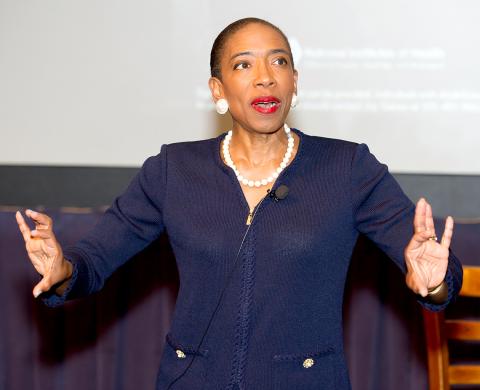‘Make Human Connections’
Cultivate ‘Relationship Currency,’ Says Morgan Stanley’s Harris

Photo: Marleen Van Den Neste
Carla Harris learned the power of taking risks when she first started at Morgan Stanley. When she began her career on Wall Street, everyone told her not to go into mergers and acquisitions because it was tough for women. She chose to pursue the specialty market anyway. Now a vice chair at Morgan Stanley, Harris shares the lesson she learned: Risk pays off. Even when you fail, you learn and grow, so it’s worth it.
She visited NIH recently, at the invitation of the Office of Equity, Diversity, and Inclusion, to share some advice on achieving personal success that also produces organizational success.
Vice chair of global wealth management and senior client advisor at Morgan Stanley, Harris talked about the importance of diversity, not only as it applies to funds and financial portfolios, but also in establishing diversified workplaces.
Financial portfolios are stronger when diversified because of the strengths that each fund brings to the mix, as is the workplace when it pulls from a diverse mix of backgrounds, knowledge and expertise, she explained.
Harris focused on three of her “pearls” of wisdom that she said are centerpieces to personal and organizational success.
“Pedigrees do not maximize success,” said Harris, who holds a degree in economics as well as an M.B.A. She offered three components of a strategic win—performance currency, relationship currency and risk taking.
Performance currency, she said, is generated by delivering what is asked of you plus more. Performance currency can get you noticed, paid, promoted and can attract sponsors. But still that only gets you so far.
It is relationship currency that has the higher return on investment, Harris suggested.
Drawing a correlation between investing in the stock market and investing in yourself, she said, “Performance currency premiums can drop…It is relationship currency that doesn’t experience diminishing returns…Relationship currency is investing in the people in your environment.”
Harris noted that contributions will get you noticed, but if you fail to make human connections and interactions through “frequency of touch,” then performance currency will lose its value. What builds relationships is frequency of touch—brief chats with colleagues throughout the workday or just noticing and greeting coworkers.
“I don’t care how hard you work, I don’t care how smart you are,” she said, “you’re going to need somebody else’s relationship currency to do well. You can’t maximize your success in any professional seat without relationships...[This includes] the sponsor relationship, which is the person that behind closed doors will use their capital to speak on your behalf.”
Part of relationship currency is cultivating advisors, mentors and sponsors.
A mentor offers you tailored advice on a variety of things and knows you well. “A mentor is who you share your feelings with—fears, goals, needs,” said Harris. “But more importantly, you want to get a mentor who has gone the path that you’ve gone.”
Harris’s final pearl? “Be comfortable with change,” she concluded. “Change shows growth and adaptability. Fear has no place in your success equation.”
Always “expect to win” in every endeavor, she continued. “Be intentional about everything” and remember “no one has a monopoly on intelligence.” She urged the audience to use the most underutilized tool in your toolbox—networking. “Everyone has personal influential currency,” she said.
Harris’s talk is archived at https://videocast.nih.gov/Summary.asp?Live=26023&bhcp=1. Copies of her book Strategize to Win were given to audience members at the event. To request a copy while supplies last, contact joy.gaines@nih.gov.
